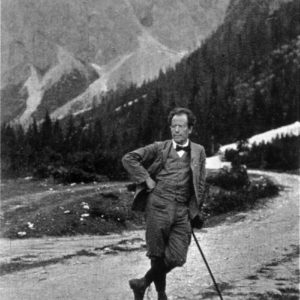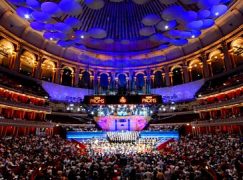Was Mahler strictly for the birds?
OrchestrasMessage from reader Tony Sanderson:
On Sunday 7th November, before Hilary Hahn’s stunning performances of Vaughan Williams’ The Lark Ascending and Prokofiev’s First Violin Concerto with standing ovations and two encores, there was a performance of Gabriella Smith’s highly original orchestral piece Tumblebird Contrails. played by the Philharmonia Orchestra conducted by Elim Chan. (review here).
Before the concert, Laurence Rose, conservationist with the RSPB, author and composer, discusses how composers including Vaughan Williams, Gabriella Smith and Messiaen have been inspired by the sounds, movements and interactions of birds.
In the Q&A part of the talk, I was able to ask him a question that had been bugging me for fifty years, since I heard the late Antony Hopkins in a Talking about Music broadcast ridicule Gustav Maler’s use of a falling fourth rather than a falling third as was used by Saint-Saëns in The Cuckoo in the Depth of the Woods from The Carnival of the AnimalsI, which Antony played with great glee to show much better Saint-Saëns had done it. Even though as a teenager and new to classical music, I knew Mahler would have got it right.
So, I asked Laurence about this, referring to Antony Hopkins’ talk. Mahler indicated in his score that it was the sound of a cuckoo, Laurence said, and he had listened to many thousands of cuckoo recordings to hunt down a Mahler cuckoo – and yes, he had come across one and said it was highly possible that Mahler would have heard a cuckoo sing with a perfect falling fourth while in his composing hut.
So, after fifty years, my faith in Mahler was rewarded.

UPDATE: No, Mahler was not cuckoo






Mahler has more than just the Cuckoo.
“Du wonnigliche Nachtigall, und Rotkehlchen hinter der Hecken…”
“Sprach zu mir der lust’ge Fink…”
Zicküt!
In France where I live I have frequently heard a cuckoo call a perfect 4th. Minor & major 3rds are common. On one occasion I heard an augmented 4th.
I used to mock Mahler also! Apologies, Gustav!
Did the cuckoos use just intonation or some other temperament?
Most birds use the Avian mode.
French cuckoos widen the interval to give their utterance a broader scope, it is a chauvinistic trait – ‘our interval is bigger because it’s French!’ Also there are reports that birds in France are influenced by recordings of Messiaen that people play at an open window, so that the inspired animals forward the right type of sounds and this has meanwhile spread through at least 3 provinces.
I wonder what Tengmalm’s Owl sounds like in France these days? In Le Mystère De La Sainte Trinité cycle it sounds nothing like the real bird, though the music is great. A mistake perhaps?
There is the suspicion that the bird saw Messiaen notating and quickly changed its tune. It’s a bit like the peasants visited by Bartok with his early gramophone tube, when they just made-up al kinds of folk tunes to please the man.
I’m sure this cuckoo was hired for the occasion.
When I lived in Vancouver, musicians from different neighbourhoods would argue about what interval Black-capped Chickadees sang – a minor third or a major second? Now where I live it’s roughly a major third with a Nachschlag.
How about Messian? He was so good at capturing birdsong, hearing a concert of his music outdoors is usually much superior to a formal concert hall.
John Luther Adams’s Songbird songs is also stunning outdoors.
I’ve heard Mahler played many times over the years at the Aspen Music Festival. There hasn’t been a single time while listening to Mahler 1 that the magpies outside the tent have not echoed those bird-like sounds.
Not nearly as much so as Einojuhani Rautavaara. His Concerto for Birds and Orchestra “Cantus Arcticus”, Op. 61 is truly for the birds.
Where I live, the pedestrian-controlled traffic intersections chirp a perfect fourth when the button is pressed. Although it amuses nobody but myself, I like to hum the passage from Mahler 1 while pressing the button.
Slow day at the office, I guess.
Mahler may have got his cuckoo right, but I ask you, are his depictions of angels and demons entirely accurate?
I called the Vatican with this question and the prelate told me: ‘If Mahler got the cuckoo right, he will be right as well for the other flying circus.’
Musical intervals as related to the origins of the classical music of India:
Shadja (tonic) cry of the peacock
Rishaba (second) cry of the bull
Gandhara (third) cry of the goat
Madhyama (fourth) cry of the heron
Panchama (fifth) cry of the cuckoo
Dhaivata (sixth) cry of the horse
Nishada (seventh) cry of the elephant
http://azuremilesrecords.com/originsofmusic.html
http://azuremilesrecords.com/mangobird.html
Indeed, and the most remarkable thing is that this is all correct. This has been checked-out by a research team from the Texas Institute of Technology who went on a project journey in 2011 through all states of India. All these animals obey intervallic instructions.
“Several ancient music scholars maintained that the intervals of the notes of the natural scale were determined by the sounds certain animals make.”
“Whether this theory is completely and scientifically true or not, it is nonetheless colorful and credible to a certain degree.” (Ravi Shankar)
“The cuckoo comes in April, sings the month of May, changes its tune in the middle of June, and in July he flies away.” The cuckoo is an extraordinary bird.
In the spring, the call is usually a descending minor third, in early summer most often a major third, and in late summer generally a fourth (well almost). It seems nobody knows why. And before anyone criticises the “he” in the poem, only the male bird sings distinct intervals.
it is just a matter of time before the ornithological woke crowd gets wind of this and intervenes.
But the question is whether Mahler was a (klepto-)parasite himself when it came to Hans Rott?
Mahler would have been more than aware of the accurate sounds of birdsong, especially those near his composing hut. Although he did shoot the ones that annoyed him, apparently.